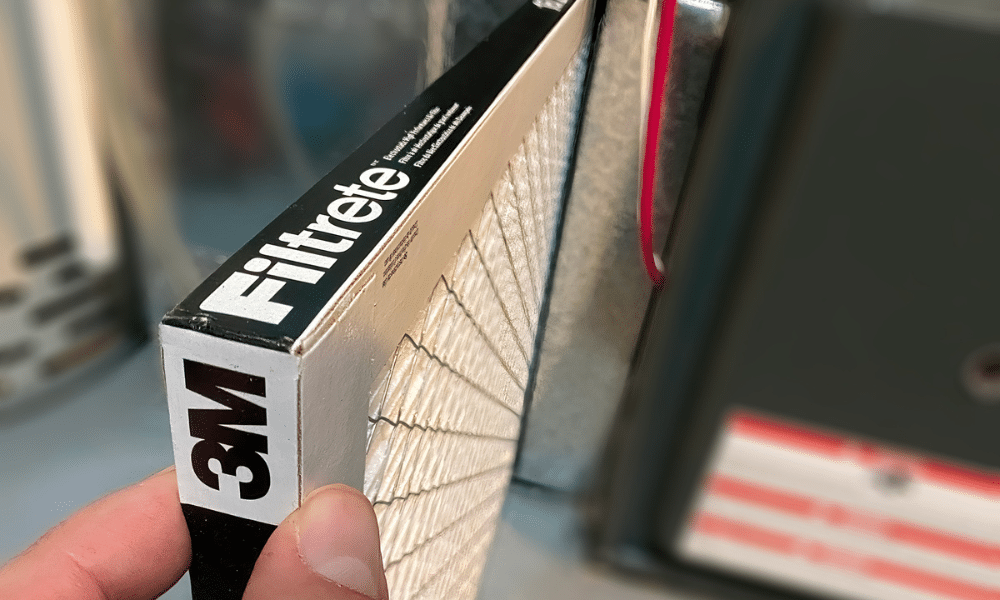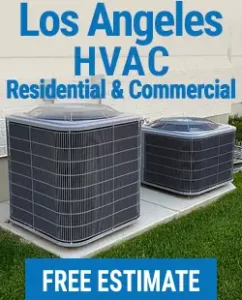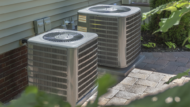How AC Filters Improve Indoor Air Quality
Your air conditioning filter is the first line of defense against airborne pollutants. It traps dust, pollen, pet dander, and bacteria, preventing them from circulating in your home. This filtration is crucial for maintaining a healthy indoor environment, especially for households with allergy sufferers, asthma patients, or individuals with other respiratory conditions. Clean filters not only enhance comfort but also significantly reduce health risks.
According to the Environmental Protection Agency (EPA), indoor air can be two to five times more polluted than outdoor air. Contaminants such as mold spores, pollen, dust mites, and harmful bacteria accumulate in poorly filtered air, exacerbating allergies, asthma, and other respiratory issues. Children and older people are particularly vulnerable to these pollutants, making effective filtration even more critical.
A high-quality filter reduces these contaminants, providing cleaner air and promoting better health for your family. Choosing the right filter can dramatically improve air quality, reduce airborne allergens, and create a healthier living environment. Filters with higher MERV ratings can capture even finer particles, offering protection for those with sensitive immune systems or chronic health conditions.
Energy Efficiency Starts with a Clean Filter
A dirty or clogged air filter forces your HVAC system to work harder, increasing energy consumption, utility bills, and wear on the system’s components. This inefficiency not only affects your wallet but can also lead to inconsistent temperature regulation and reduced overall performance. With a clean filter, airflow improves, allowing the system to maintain your desired temperature more efficiently while reducing unnecessary strain.
The U.S. Department of Energy estimates that replacing a clogged filter can lower an air conditioner’s energy use by up to 15%. A household spending $2,000 annually on energy translates to savings of $300. Clean filters also reduce strain on your HVAC system, preventing overheating and potential breakdowns, which can be costly and inconvenient. Regular maintenance of your filters helps preserve your HVAC system’s reliability and ensures consistent comfort throughout your home.
Additionally, clean filters contribute to environmental sustainability. Lowering energy consumption, you help reduce your home’s carbon footprint, supporting greener, more eco-friendly practices. Efficient systems not only save money but also play a role in reducing greenhouse gas emissions, making clean filters a small yet impactful step toward protecting the environment.
Protecting and Extending HVAC System Life
Neglected air filters allow dust, debris, and other pollutants to accumulate in your HVAC system, leading to significant wear and tear over time. This buildup forces your system to work harder, straining components like the fan, motor, and coils, while reducing their overall effectiveness and lifespan. Additionally, clogged filters can cause airflow restrictions, leading to overheating or even system failure if left unchecked.
Replacing filters regularly prevents this buildup, allowing your system to operate efficiently, reducing strain on key components, and helping it last longer. An HVAC system is a significant investment, with replacement costs averaging between $5,000 and $10,000, according to HomeAdvisor. Proper maintenance, including clean filters, not only helps you avoid premature replacement but also ensures your system continues to provide consistent and reliable performance for years to come. Routine care extends the life of your unit while improving energy efficiency and overall comfort in your home.
Fewer Repairs and Lower Maintenance Costs
 Clean air filters significantly reduce the likelihood of HVAC breakdowns by maintaining proper airflow and system performance. When filters are dirty, airflow becomes restricted, forcing the system to work harder, which can lead to overheating, freezing, or even complete failure. These issues often result in costly professional repairs that could have been easily avoided with routine filter changes. Neglected filters also put additional strain on key components, accelerating wear and tear.
Clean air filters significantly reduce the likelihood of HVAC breakdowns by maintaining proper airflow and system performance. When filters are dirty, airflow becomes restricted, forcing the system to work harder, which can lead to overheating, freezing, or even complete failure. These issues often result in costly professional repairs that could have been easily avoided with routine filter changes. Neglected filters also put additional strain on key components, accelerating wear and tear.
By maintaining a clean filter, you can minimize the risk of breakdowns, extend your system’s lifespan, and save on repair costs. HomeAdvisor says the average HVAC repair costs $150 to $450, while significant issues like compressor failures can cost upwards of $2,000. Routine filter replacement, which typically costs far less, is a simple and effective way to protect your system. This small yet impactful step ensures your HVAC system operates efficiently, reducing the chances of unexpected expenses and ensuring peace of mind.
Consistent Comfort Throughout Your Home
Dirty air filters can lead to uneven cooling or heating in your home. Restricted airflow causes some rooms to feel significantly warmer or cooler than others, creating uncomfortable and frustrating temperature imbalances. These variations not only disrupt comfort but can also indicate that your system is struggling to operate efficiently.
A clean filter allows air to flow freely, ensuring consistent temperatures throughout your living space. With proper filtration, your HVAC system can evenly distribute cooled or heated air, making every room in your home more comfortable and eliminating annoying hot or cold spots. This consistency enhances overall comfort, promotes better energy efficiency, and ensures your HVAC system operates as effectively as possible, providing reliable performance across all areas of your home.
Choosing the Right Filter for Your System
Not all filters are created equal, and selecting the right one for your HVAC system is crucial for both performance and air quality. Filters are rated using the Minimum Efficiency Reporting Value (MERV), which measures their ability to capture particles such as dust, pollen, and mold. The right filter balances effective filtration with adequate airflow, ensuring your system operates efficiently while improving indoor air quality.
- MERV 8-13: Ideal for most residential systems, capturing a variety of pollutants, including dust, pet dander, and mold spores, without overly restricting airflow.
- MERV 14 and Higher: Recommended for households with allergies, asthma, or other respiratory conditions, as these filters offer finer filtration, trapping even smaller particles like bacteria and smoke.
While higher-rated filters provide superior filtration, they may restrict airflow if your system isn’t designed to handle them. This can lead to decreased efficiency and strain on the system. Always consult your HVAC technician to determine the best filter for your unit and household needs. They can help you find the right balance between filtration performance and system compatibility, ensuring optimal results for your home.
How Often Should You Replace Your Filter?
The frequency of filter replacement depends on factors like filter type, household size, system usage, and indoor air quality. Regular replacement is crucial for maintaining system efficiency and healthy air circulation.
- Standard Filters: Replace every 1 to 3 months, depending on use, air quality, and environmental conditions.
- High-Quality Filters: These may last up to 6 months, though regular monthly checks are still recommended to ensure optimal performance.
- Homes with Pets or Smokers: Require more frequent replacements due to increased contaminants like pet hair, dander, and smoke particles, which can clog filters faster.
Checking your filter monthly is the best way to ensure it’s clean and functional. If the filter appears dirty, clogged, or excessively dusty, replace it immediately to maintain efficiency, prevent strain on your HVAC system, and avoid increased energy consumption. Staying proactive with filter changes helps extend the life of your system, improve air quality, and ensure consistent comfort throughout your home.
The Environmental and Financial Impact of Clean Filters
Clean air filters contribute to a more sustainable home by reducing energy consumption and minimizing waste. When your HVAC system operates efficiently, it uses less power, which directly lowers your carbon footprint and helps reduce greenhouse gas emissions. Cleaner filters also prevent unnecessary strain on your system, reducing wear and tear on parts that might otherwise require replacement.
From a financial perspective, clean filters lead to significant savings. They reduce utility bills, minimize repair costs, and extend the life of your HVAC system by ensuring it operates optimally. Over time, these cumulative savings far outweigh the relatively low cost of purchasing and replacing filters regularly, making clean filters an investment in both your wallet and the environment. Additionally, maintaining clean filters enhances air quality, benefiting both your health and the overall sustainability of your home.
Additional Benefits of Clean Air Filters
The advantages of clean air filters extend well beyond energy savings and system performance, offering benefits that enhance the overall quality of your home environment. They also contribute to:
- Healthier Living Spaces: Filters trap allergens, bacteria, mold, and other pollutants, preventing them from circulating in your home and creating a safer, healthier environment for your family. This is particularly important for individuals with allergies, asthma, or other respiratory conditions.
- Improved System Efficiency: Clean filters ensure your HVAC system operates as intended, reducing strain on components like the fan and motor, which improves airflow and maintains consistent temperature control throughout your home.
- Fewer Service Interruptions: Routine maintenance and clean filters minimize the risk of unexpected breakdowns, keeping your system running smoothly and avoiding costly repairs.
Investing in high-quality filters and maintaining them regularly ensures your HVAC system delivers optimal comfort, reliability, and air quality. Over time, this proactive care improves system longevity, reduces energy costs, and provides peace of mind for your household.
The Essential Role of AC Filters
Air conditioning filters may be small components, but they have a significant impact on your home’s comfort, health, and energy efficiency. By trapping airborne particles, they improve indoor air quality, enhance HVAC system performance, and help lower energy bills. Regularly replacing your filter is one of the simplest and most effective steps you can take to maintain your system and create a healthier, more comfortable living environment.
Whether you’re aiming to reduce energy costs, improve air quality for allergy sufferers, or ensure consistent and reliable home comfort, clean filters are essential. Choosing the right filter for your system and replacing it at recommended intervals not only protects your HVAC equipment but also promotes long-term savings and peace of mind. Make this small but impactful habit part of your routine and enjoy the lasting benefits it brings to your household year-round.







